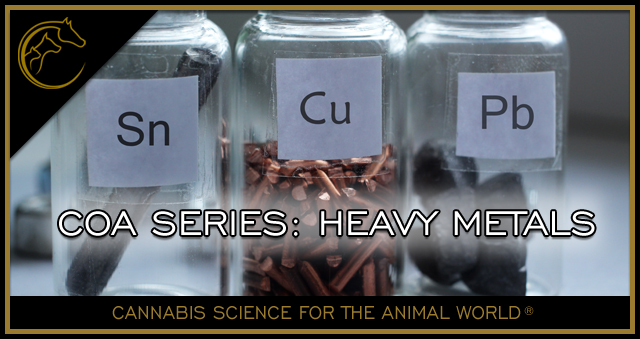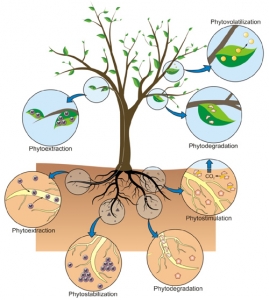COA Series: Heavy Metals
 Every pet parent wants to make sure that they’re providing their companions with the best care possible. In our series about testing protocols and Certificates of Analysis (COAs), we are detailing the many steps we here at Canna Companion take to ensure that our products are safe and free from contamination. In this entry, we’ll be discussing heavy metals, and for your reference, here’s the list of tests run on ingredients and end products.
Every pet parent wants to make sure that they’re providing their companions with the best care possible. In our series about testing protocols and Certificates of Analysis (COAs), we are detailing the many steps we here at Canna Companion take to ensure that our products are safe and free from contamination. In this entry, we’ll be discussing heavy metals, and for your reference, here’s the list of tests run on ingredients and end products.
- Residual Solvent Analysis
- Mycotoxin
- Pesticides
- Heavy Metals
- Microbial
- Potency & Terpenes
Heavy Metal Testing
Among the more common heavy metals associated with toxicity are lead, arsenic, mercury, and cadmium. Exposure to these items can occur in a number of ways including air, soil, or water pollution, improperly applied coating on packaging or bowls, and contaminated foods or medicines. Heavy metal poisoning can take place via both acute and long term exposure, and while compounds like inorganic arsenic increasingly rare, exposure can still occur via ashes of treated lumber, for example. Metals like lead cause a variety of health issues include anemia, cancer, and seizures, while mercury exposure results in symptoms ranging from severe GI distress to eczema (in survivors or toxicity) to death.
All species of the Cannabis genus are classified as phytoremediation plants, which means that they are particularly adept at pulling numerous types of contaminants, including heavy metals, out of the soil and storing them in plant material. Heavy metals persist within the environment, and during the normal processing of hemp plant biomass, these toxins are concentrated. The small size of our patients further exacerbates the hazard as a relatively safe amount to a human, becomes highly toxic in cats and dogs. While there are treatments available for heavy metal poisoning, they can be costly and are not 100% effective. Thorough testing is an easy and highly accurate way to help prevent the problem in the first place.
While the FDA does provide action levels whereby companies must remain under certain testable levels of heavy metals, this does not include pet supplements. Washington state does not require testing for heavy metals and, as a result, many of the state certified laboratories have been slow to include it as an option. Since a panel is available via our primary certified lab, we test all primary ingredients and end products for arsenic, cadmium, lead and mercury. We tolerate “None Detected” (ND) quantities of heavy metals in our finished products, and trace or ND in primary ingredients. Because one can never truly have ‘zero’ quantity, laboratories provide results as LOD (limit of detection) relative to LOQ (limit of quantitation). ND results ensure Canna Companion products have so little heavy metal content, it is not detectable with current technology.

You may request a copy of a batch associated COA via our Customer Service department at any time. Rest assured that we are committed to keeping your pets safe and healthy.




